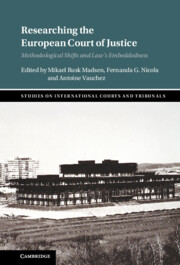Book contents
- Researching the European Court of Justice
- Studies on International Courts and Tribunals
- Researching the European Court of Justice
- Copyright page
- Contents
- Notes on Contributors
- 1 From Methodological Shifts to EU Law’s Embeddedness
- Part I Cases
- Part II Judicial Frames
- 6 Inquiring into Conceptual Practices
- 7 Through the Lens of Language
- 8 A Sense of Common Purpose
- 9 Judge Biographies as a Methodology to Grasp the Dynamics inside the CJEU and Its Relationship with EU Member States
- Part III Socio-legal Practices
- Index
6 - Inquiring into Conceptual Practices
Legal Controversy at the Court of Justice of the European Union
from Part II - Judicial Frames
Published online by Cambridge University Press: 05 May 2022
- Researching the European Court of Justice
- Studies on International Courts and Tribunals
- Researching the European Court of Justice
- Copyright page
- Contents
- Notes on Contributors
- 1 From Methodological Shifts to EU Law’s Embeddedness
- Part I Cases
- Part II Judicial Frames
- 6 Inquiring into Conceptual Practices
- 7 Through the Lens of Language
- 8 A Sense of Common Purpose
- 9 Judge Biographies as a Methodology to Grasp the Dynamics inside the CJEU and Its Relationship with EU Member States
- Part III Socio-legal Practices
- Index
Summary
This chapter proposes an inquiry into the surface of EU law. This implies a non-formalist study of legal forms such as legal sentences, concepts and techniques, a rich field of inquiry in itself. These are not mere tools, totally under control, used to achieve certain ends defined in other terms, outside the law. They are far more intriguing and fascinating than that. These legal forms participate to the constitution of legal and social realities that they pretend to regulate. They enable and limit what participants of a language-game can do, and they can even influence what they may want to do. The proposed methodology to study the CJEU implies focusing on law and legal concepts as a set of knowledge practices and inquiries on the transformative power of legal techniques. It should be distinguished from classical studies on the court, mainly dealing with interpretation, as well as from works focusing on power relations between legal actors. Through the presentation of some cases in EU citizenship case law, this chapter focuses on the constitutive dimension of the legal controversy surrounding the Court of Justice of the European Union’s rulings.
- Type
- Chapter
- Information
- Researching the European Court of JusticeMethodological Shifts and Law's Embeddedness, pp. 133 - 157Publisher: Cambridge University PressPrint publication year: 2022

